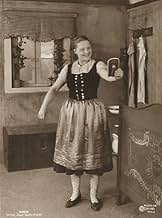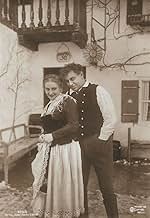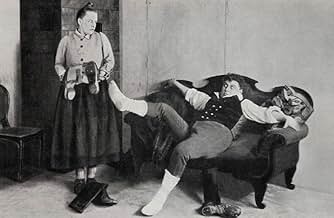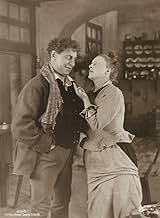Hübsche Tochter darf erst heiraten, wenn die hässliche einen Mann hat. Ein Trick erreicht es.Hübsche Tochter darf erst heiraten, wenn die hässliche einen Mann hat. Ein Trick erreicht es.Hübsche Tochter darf erst heiraten, wenn die hässliche einen Mann hat. Ein Trick erreicht es.
Jakob Tiedtke
- Mathias Kohlhiesel - Wirt des 'Dorfkruges'
- (as Jacob Tiedke)
Gustav von Wangenheim
- Paul Seppl
- (as Gustav v. Wangenheim)
Willy Prager
- Der Handelsmann
- (as Willi Prager)
Handlung
WUSSTEST DU SCHON:
- WissenswertesProduktionsfirma: Messters Projektion, Berlin, No. 9565 .
Ausgewählte Rezension
Not all Ernst Lubitsch films are equal, but if there's one thing the filmmaker was known for, it was a robust sense of comedy that spanned from the early silent era and well past the advent of talkies. I'm pleased to say that in 'Kohlhiesels Töchter' one recognizes the same wonderfully droll traits that marked Lubitsch as such a reliable purveyor of gaiety. The situational humor is solid, but we're also treated to brilliantly exaggerated characters - depicted with performances that are just as energized - and touches of physical comedy on top. It helps that Lubitsch's frequent collaborator Hanns Kräly wrote the original play as well as co-writing the screenplay here; clearly this is an instance where the duo's partnership bore great fruit.
The varied characters are a blast, as are the intertitles relating some witty dialogue. Broadly speaking the narrative perhaps isn't wholly remarkable, but it's a scenario that's primed and ready for every other element to finish, and thereby dazzle in the process. And so it is: the scene writing is exceptional, geared only for utmost silliness, and each is realized by all involved in strict adherence to that vibrant spirit. Direction, cinematography, and editing alike are all marvelous adept, handily joining the swell company of Lubitsch's other silent successes. Art direction, production design, hair and makeup, costume design, the very particular arrangement of each passing moment - in all ways, 'Kohlhiesels Töchter' is such vivid, lively fun, from beginning to end.
Of course this is in no small part thanks to an outstanding cast, inhabiting their farcical roles with all due merriment and heart. Jakob Tiedtke as Kohlhiesel himself, Henny Porten in a dual role as both daughters Liesel and Gretel, Emil Jannings as Xaver, Gustav von Wangenheim as Seppl - each and every one embraces fantastic, animated physicality and range in their acting, body language and facial expressions alike. It's an absolute joy to watch them all at play, whether individually or as scene partners; as much as the scene writing is an anchor for the feature, the splendid contributions of the assembled actors most certainly serve as another.
While bearing some of those same qualities that perhaps make silent films difficult to abide for some modern viewers, in my opinion the comedy in 'Kohlhiesels Töchter' is so sharp and strong as to well outweigh any such potential impediment. Like some of Lubitsch's other comedies of the era (e.g. 'The wild cat,' or 'The oyster princess'), the ridiculousness on hand is so pervasive and complete that I, for one, would have few reservations about recommending it even to those who don't typically watch early cinema. If anything, there's a reasonable argument to be made that the picture becomes a hair myopic in so heavily accentuating the absurdities - which is to say, small flourishes of cruelty or sexism, intended to further the frivolity, kind of come across simply as cruelty and sexism. Still, when all is said and done even these indelicacies are quite painted over by the roundly solid good time the movie otherwise represents. If there are any imperfections here, then it is a matter of degrees, not whole numbers.
It may not entirely be for everyone, but as another entry in a career filled with excellence, 'Kohlhiesels Töchter' strikes me as another dependably entertaining feature. Recommended above all for audiences who already favor the silent era, this Lubitsch comedy gets two hearty thumbs up from me!
The varied characters are a blast, as are the intertitles relating some witty dialogue. Broadly speaking the narrative perhaps isn't wholly remarkable, but it's a scenario that's primed and ready for every other element to finish, and thereby dazzle in the process. And so it is: the scene writing is exceptional, geared only for utmost silliness, and each is realized by all involved in strict adherence to that vibrant spirit. Direction, cinematography, and editing alike are all marvelous adept, handily joining the swell company of Lubitsch's other silent successes. Art direction, production design, hair and makeup, costume design, the very particular arrangement of each passing moment - in all ways, 'Kohlhiesels Töchter' is such vivid, lively fun, from beginning to end.
Of course this is in no small part thanks to an outstanding cast, inhabiting their farcical roles with all due merriment and heart. Jakob Tiedtke as Kohlhiesel himself, Henny Porten in a dual role as both daughters Liesel and Gretel, Emil Jannings as Xaver, Gustav von Wangenheim as Seppl - each and every one embraces fantastic, animated physicality and range in their acting, body language and facial expressions alike. It's an absolute joy to watch them all at play, whether individually or as scene partners; as much as the scene writing is an anchor for the feature, the splendid contributions of the assembled actors most certainly serve as another.
While bearing some of those same qualities that perhaps make silent films difficult to abide for some modern viewers, in my opinion the comedy in 'Kohlhiesels Töchter' is so sharp and strong as to well outweigh any such potential impediment. Like some of Lubitsch's other comedies of the era (e.g. 'The wild cat,' or 'The oyster princess'), the ridiculousness on hand is so pervasive and complete that I, for one, would have few reservations about recommending it even to those who don't typically watch early cinema. If anything, there's a reasonable argument to be made that the picture becomes a hair myopic in so heavily accentuating the absurdities - which is to say, small flourishes of cruelty or sexism, intended to further the frivolity, kind of come across simply as cruelty and sexism. Still, when all is said and done even these indelicacies are quite painted over by the roundly solid good time the movie otherwise represents. If there are any imperfections here, then it is a matter of degrees, not whole numbers.
It may not entirely be for everyone, but as another entry in a career filled with excellence, 'Kohlhiesels Töchter' strikes me as another dependably entertaining feature. Recommended above all for audiences who already favor the silent era, this Lubitsch comedy gets two hearty thumbs up from me!
- I_Ailurophile
- 22. März 2022
- Permalink
Top-Auswahl
Melde dich zum Bewerten an und greife auf die Watchlist für personalisierte Empfehlungen zu.
Details
- Laufzeit1 Stunde 4 Minuten
- Farbe
- Sound-Mix
- Seitenverhältnis
- 1.33 : 1
Zu dieser Seite beitragen
Bearbeitung vorschlagen oder fehlenden Inhalt hinzufügen

Oberste Lücke
By what name was Kohlhiesels Töchter (1920) officially released in Canada in English?
Antwort























